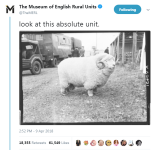THBGato
Litaddict
- Joined
- Jan 27, 2024
- Posts
- 708
Bollocks! I just remembered the question I wanted to ask in my opening post. I forgot to include it and it was half the reason why I started this thread!
I'm currently writing a story featuring a BBC Radio journalist. Americans, Aussie and the rest know what the BBC is, right? Or do I need to explain?
I'm currently writing a story featuring a BBC Radio journalist. Americans, Aussie and the rest know what the BBC is, right? Or do I need to explain?
